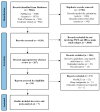Procedures in Fecal Microbiota Transplantation for Treating Irritable Bowel Syndrome: Systematic Review and Meta-Analysis
- PMID: 36902512
- PMCID: PMC10003588
- DOI: 10.3390/jcm12051725
Procedures in Fecal Microbiota Transplantation for Treating Irritable Bowel Syndrome: Systematic Review and Meta-Analysis
Abstract
Background: Irritable bowel syndrome (IBS) is a prevalent gastrointestinal disease with no effective treatment. Altered microbiota composition seems implicated in disease etiology and therefore fecal microbial transplantation (FMT) has emerged as a possible treatment therapy. To clarify the clinical parameters impacting FMT efficacy, we conducted a systematic review with subgroup analysis.
Methods: A literature search was performed identifying randomized controlled trials (RCTs) comparing FMT with placebo in IBS adult patients (8-week follow-up) with a reported improvement in global IBS symptoms.
Results: Seven RCTs (489 participants) met the eligibility requirements. Although FMT seems not to be effective in global improvement of IBS symptoms, subgroup analysis shows that FMT through gastroscopy or nasojejunal tube are effective IBS treatments (RR 3.03; 95% CI 1.94-4.73; I2 = 10%, p < 0.00001). When considering non-oral ingestion routes, IBS patients with constipation symptoms are more likely to benefit from FMT administration (p = 0.003 for the difference between IBS subtypes regarding constipation). Fresh fecal transplant and bowel preparation seem also to have impact on FMT efficacy (p = 0.03 and p = 0.01, respectively).
Conclusion: Our meta-analysis revealed a set of critical steps that could affect the efficacy of FMT as clinical procedure to treat IBS, nevertheless more RCTs are needed.
Keywords: fecal microbiota transplantation; irritable bowel syndrome; meta-analysis; microbiome therapy; randomized controlled trials.
Conflict of interest statement
The authors declare no conflict of interest.
Figures




Similar articles
-
A meta-analysis of randomized controlled trials evaluating the effectiveness of fecal microbiota transplantation for patients with irritable bowel syndrome.BMC Gastroenterol. 2024 Jul 5;24(1):217. doi: 10.1186/s12876-024-03311-x. BMC Gastroenterol. 2024. PMID: 38970007 Free PMC article.
-
Efficacy of Fecal Microbiota Transplantation in Irritable Bowel Syndrome: A Systematic Review and Meta-Analysis.Am J Gastroenterol. 2019 Jul;114(7):1043-1050. doi: 10.14309/ajg.0000000000000198. Am J Gastroenterol. 2019. PMID: 30908299 Free PMC article.
-
Fecal Microbiota Transplantation for Patients With Irritable Bowel Syndrome: A Meta-Analysis of Randomized Controlled Trials.Front Nutr. 2022 May 27;9:890357. doi: 10.3389/fnut.2022.890357. eCollection 2022. Front Nutr. 2022. PMID: 35719141 Free PMC article.
-
Efficacy of Fecal Microbiota Transplantation in Irritable Bowel Syndrome: A Meta-Analysis of Randomized Controlled Trials.Front Cell Infect Microbiol. 2022 Feb 28;12:827395. doi: 10.3389/fcimb.2022.827395. eCollection 2022. Front Cell Infect Microbiol. 2022. PMID: 35295757 Free PMC article.
-
Fecal microbiota transplantation for the treatment of irritable bowel syndrome: A systematic review and meta-analysis.World J Gastroenterol. 2023 May 28;29(20):3185-3202. doi: 10.3748/wjg.v29.i20.3185. World J Gastroenterol. 2023. PMID: 37346153 Free PMC article.
Cited by
-
Fecal Microbiota Transplantation for Disorders of Gut-Brain Interaction: Current Insights, Effectiveness, and Future Perspectives.Curr Gastroenterol Rep. 2025 Jul 9;27(1):50. doi: 10.1007/s11894-025-01001-6. Curr Gastroenterol Rep. 2025. PMID: 40632357 Review.
-
Clinical efficacy and safety of faecal microbiota transplantation in the treatment of irritable bowel syndrome: a systematic review, meta-analysis and trial sequential analysis.Eur J Med Res. 2024 Sep 18;29(1):464. doi: 10.1186/s40001-024-02046-5. Eur J Med Res. 2024. PMID: 39289768 Free PMC article.
-
A "movement" worth making: why and how Transfusion Services can play a role in Fecal Microbiota Transplant programs.Blood Transfus. 2025 May-Jun;23(3):275-282. doi: 10.2450/BloodTransfus.929. Epub 2025 Mar 12. Blood Transfus. 2025. PMID: 40116683 Free PMC article. Review.
-
Advancing Research and Treatment: An Overview of Clinical Trials in Myalgic Encephalomyelitis/Chronic Fatigue Syndrome (ME/CFS) and Future Perspectives.J Clin Med. 2024 Jan 6;13(2):325. doi: 10.3390/jcm13020325. J Clin Med. 2024. PMID: 38256459 Free PMC article. Review.
-
Irritable Bowel Syndrome: Treating the Gut and Brain/Mind at the Same Time.Cureus. 2023 Aug 13;15(8):e43404. doi: 10.7759/cureus.43404. eCollection 2023 Aug. Cureus. 2023. PMID: 37706135 Free PMC article. Review.
References
-
- Sperber A.D., Bangdiwala S.I., Drossman D.A., Ghoshal U.C., Simren M., Tack J., Whitehead W.E., Dumitrascu D.L., Fang X., Fukudo S., et al. Worldwide Prevalence and Burden of Functional Gastrointestinal Disorders, Results of Rome Foundation Global Study. Gastroenterology. 2021;160:99–114.e3. doi: 10.1053/j.gastro.2020.04.014. - DOI - PubMed
-
- Sperber A.D., Dumitrascu D., Fukudo S., Gerson C., Ghoshal U.C., Gwee K.A., Hungin A.P.S., Kang J.Y., Minhu C., Schmulson M., et al. The global prevalence of IBS in adults remains elusive due to the heterogeneity of studies: A Rome Foundation working team literature review. Gut. 2017;66:1075–1082. doi: 10.1136/gutjnl-2015-311240. - DOI - PubMed
Publication types
Grants and funding
LinkOut - more resources
Full Text Sources
Miscellaneous

